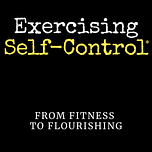There's a concept in Stoic philosophy that makes you invincible. Not in the physical sense. However, if you become skilled in applying this lesson in the moment of choice, you will be “an athlete unconquered indeed,” as Epictetus, my favourite Stoic, put it.
Hey there. It's me, Kore. And you're listening to Exercising Self-Control: From Fitness to Flourishing.
Alright, going to get philosophical today. This Stoic concept is called The Dichotomy Of Control. I like to think of it as the dichotomy of self-control, because essentially that is what it describes: what we actually can control. And it ends up being our choice. That's self-control in a nutshell.
We can consider the self to actually be the faculty of choice, and this is something that Epictetus got into with his teaching. In ancient Greek, this is called prohairesis. The translation is the faculty of choice, volition, or will. That's our power in the world.
We can influence circumstances; we can influence other people; we can influence the environment; we can rearrange the reality around us. But essentially the first thing that we need to do is choose to do these things.
When we're talking about the dichotomy of control, it goes like this: what’s within our power are things like our opinion, our aim, our intention. These are things that we can choose.
Photo by Brett Jordan on Unsplash
And everything beyond our power is anything that we cannot simply choose. Listed in what is beyond our power are: the body, property, the reputation that you have. But if we just take a step back and think of that very first word - the body. Now, this is where most people would start to say, "Well, that's not true. I can control my body. Look at me. I'm standing up now, I’ve chosen. I've chosen to sit down, I’m sitting. I'm waving my hands around as I'm arguing with you."
But as you well know, things can happen. Some people don't have as much control. There are conditions that the body either is born with or develops over time or due to accident, injury. All of a sudden that control of the body starts to look a little bit less like control. There are many things that can hinder that "control" of the body. And in the end, if you accept this dichotomy, then you'll start to relax about all the things that you don't control and focus on what you do.
And when you boil that down, there are two things that you can focus on: your intention and your volition.
An intention is an aim, something that you plan to do, are determined to do, are committed to doing. Volition, on the other hand, is that in-the-moment choice to act on your intention. Or to act counter to your intention, which wouldn't be a good thing.
As I mentioned in my previous episode, Thinking Choice versus Enacting Choice [Actually, How To Know When You've Made A Choice] volition is that moment of choice of actually following through. So when I was talking about buying the shirt, I didn't choose to buy the shirt until I actually handed over the money and then got the receipt. Then I bought the shirt. If that doesn't make sense, go and check out that episode.
So there's some differences between intention and volition that are important. One is that you can hold an intention over time, but volition is in the moment. That's when you follow through on the intention. You can have the intention to go to the gym at a certain time during the day. When you execute, that is when you are exercising your volition. So intention is the aim, volition is the act. And that is essentially what self-control is.
How this plays out in a fitness journey is that it's your job to intend to become fit and healthy, at whatever standard that is for yourself. And then you use volition to actually follow through. You introduce circumstances for your body to adapt because you can't force your body to change. That is not in your control. You will simply introduce a certain type of exercise, a certain level of resistance, and the body will respond as it will respond. I keep saying that because it's a lesson to be learned: Don't ever try to force your body to change. There's usually only regret and injury that is a result of that.
So what do you think? Let me know in the comments.
That's it for today. Catch you next time.












